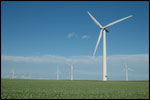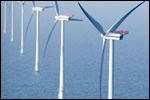Obama pledges billions for renewable energy projects

Barack Obama today declared the billions of dollars he is planning to spend on renewable energy projects off-limits to the usual bartering over the next few weeks with Congress.





Home wind turbines are generating a fraction of the energy promised by manufacturers, and in some cases use more electricity than they make, a report warns today. The results of what is thought to be the most comprehensive study undertaken of the industry show the worst performers provided just 41 watt-hours a day - less than the energy needed for a conventional lightbulb for an hour, or even to power the turbine's own electronics.

The announcement in 2007 of the introduction of Smart electricity metering led to widespread hope that Ireland could set a global example by empowering consumers to cut electricity use and generate their own renewable electricity. John Hearne investigates current progress on the initiative, and discovers signs that Ireland’s approach to smart metering could represent a missed opportunity.
The international body that advises most major governments across the world on energy policy is obstructing a global switch to renewable power because of its ties to the oil, gas and nuclear sectors, a group of politicians and scientists claims today.

Earlier this year constructireland.ie broke the news of the introduction of the pilot Home Energy Saving Scheme, a new grant funding programme designed to stimulate the en masse refurbishment of Ireland’s poorly performing existing housing stock. John Hearne travelled to one of the pilot areas to see how the scheme is working on the ground, and discover how the scheme is developing.

As we all know, Ireland is currently paying the price for the inability of its political and corporate leaders to take seriously the warning signs of an economy where property investment and borrowing generally got out of control. Looking at policy and commercial investment plans for energy supply and distribution, Richard Douthwaite asks, are the decision makers showing an alarmingly similar attitude to evident gas supply threats?

Planning ahead for Ireland’s electricity supply is by no means a simple matter, given the range of unprecedented issues that are coming to the fore. Massive cuts in emissions must be achieved, whilst decisive action is required to ensure adequate supply of electricity at a time when usage is spiraling. Richard Douthwaite explains the balance that Ireland must achieve between efficient local generation and usage and ensuring optimal interconnection to global renewable electricity supply
Energy Saving Day was a flop, its organiser admitted last night after the National Grid confirmed that across Britain energy use went up by just over one per cent.

Since the announcement last September by the Minister for the Environment of substantial improvements to be made under Part L of the Building Regulations, speculation has been rife in the construction industry about what the details of the updated regulations would entail. Jeff Colley examines some of the key parts of a regulatory improvement that will help the Irish construction industry to modernise and meet the demands of a rapidly changing world.

The introduction of smart metering later this year presents a great opportunity to engage Irish people en masse into substantially reducing their energy consumption, simply by showing them how much electricity they’re consuming, and how much the cost varies at different times of the day. However, as Richard Douthwaite warns, there is a real risk that smart metering may come in a form that benefits the electricity companies and not the end-user.

John Hearne explains how truly low energy buildings can succeed or fail depending on how they engage with their occupants.

In this special feature, Construct Ireland draws from the views, hopes and concerns of four people ideally poised to comment on the implications this directive will have on how we design, construct, renovate, manage and think about buildings in Ireland.

As oil prices surge and the need to rapidly switch to energy sources that are secure and environmentally friendly becomes increasingly apparent, more and more Irish people are tapping into the renewable energy resources at their disposal. But are the Government giving people the incentive to make the switch?
If you’re applying for planning permission to build in Cappagh, North Ballymun or Northwest Balbriggan, 30% of your heating must come from renewable energy, and your heating must be less than 50Kwh/m2 per annum—roughly twice the standard of most new homes.

The first scheme of renewable energy grants for Irish homeowners, the Greener Homes Scheme, was launched on Monday 27th March 2006 and will make grant funding available to homeowners looking to install renewable energy heating technology

The need to reduce CO2 emissions and energy consumption from buildings has never been more immediate. There is a growing consensus that we must reduce our dependence on rapidly depleting, carbon intensive fossil fuels, which, amongst other things, will involve overhauling how buildings are designed, constructed and used.

Richard Douthwaite explains how inadequate conventional energy generation is and reveals the potential that combined heat and power & energy service companies can offer.

Richard Douthwaite reveals that oil and gas peak are barely mentioned in the Government's recent energy Green Paper.

John Hearne spoke to a number of independent energy experts to develop an impartial view of the main sustainable heating options.

Construct Ireland’s Jason Walsh visited the Brooklodge in Macreddin, County Wicklow, to find out about how one hotel has found rising fossil fuel costs the perfect reason to invest in a sustainable future.